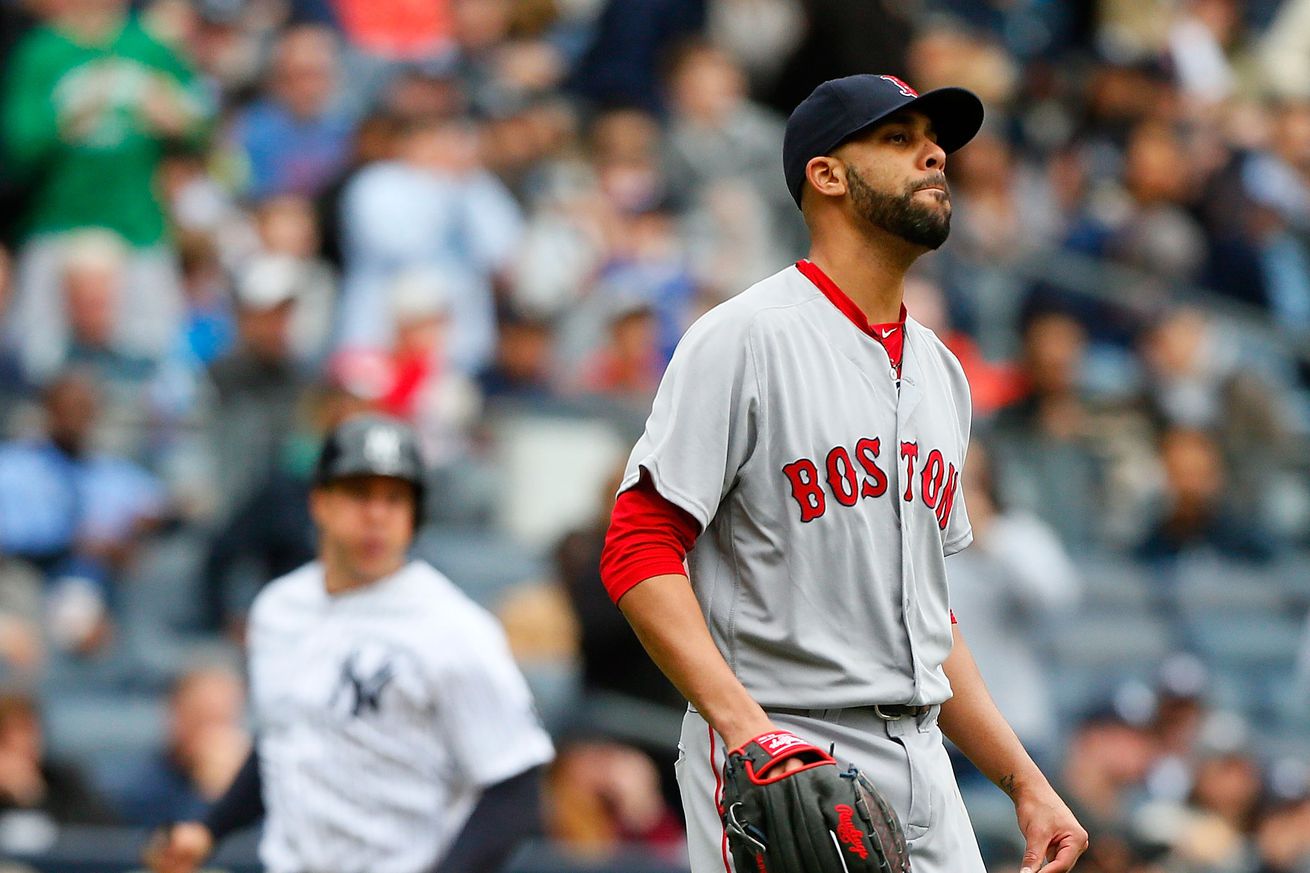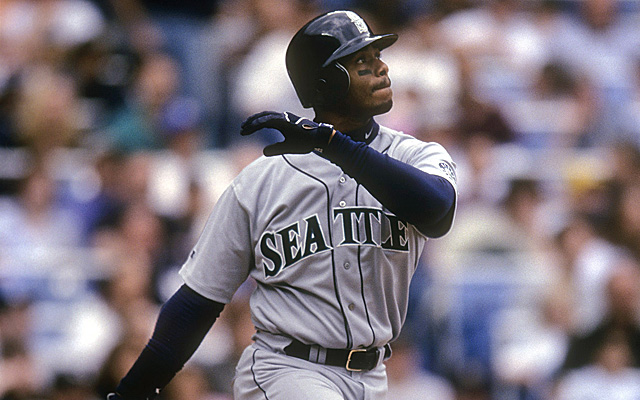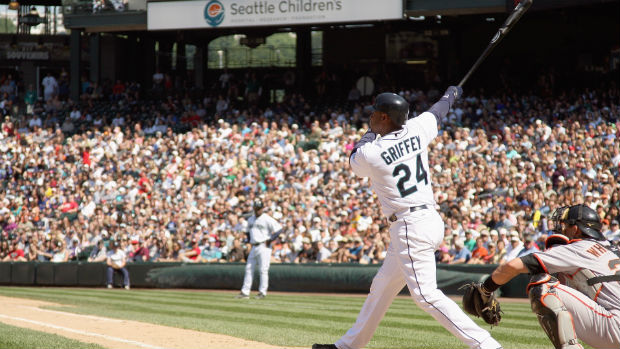| The numbers don't lie: A-Rod was much, much better than Jeter (Complex) |
My response: https://www.youtube.com/watch?v=HvkKd572vCw
To which my friend replied, "It's closer than you think..."
Actually, it's not, I thought to myself. But, wanting to end the debate right then and there, I waited until I got home so I could log on to Baseball-Reference and provide the overwhelming statistical evidence proving that while Jeter was a great player, he wasn't even in A-Rod's league. I wanted to hit him with some truth, Kenny Powers-style.
Sure enough, when I clicked over to B-R's handy WAR leaderboard, I found the unassailable proof I was looking for. Nestled in 12th place, between Ted Williams and Lou Gehrig, is Alex Rodriguez. Scroll further down the list, and you'll find Jeter lodged at 58th, between Harry Heilmann and Rafael Palmeiro. That should tell you all you need to know about their respective places in baseball history.
The difference between them is exactly 46 WAR, which is a lot. It's more than several Hall of Famers totalled in their careers, as well as near Hall of Famers such as Gil Hodges, Dave Parker, and Omar Vizquel. Current players with less include Jimmy Rollins, Joey Votto, Matt Holliday, and Ryan Braun -- all of whom have been playing at a high level for at least a decade. Add their careers to Jeter's, and you still don't have A-Rod's career.
Looking at it another way, a five-win season constitutes an All-Star caliber year. That means you could add nine All-Star seasons to Jeter's resume, and he'd still fall short of Rodriguez.
Like I said, not even close.
Even if WAR's not your bag, it still shouldn't be hard to see why A-Rod was the better player. As a hitter, he holds the edge in almost every meaningful category except for batting average, which is negated by his slight edge in OBP. Rodriguez was also a much better power hitter: Jeter had good power for a shortstop, but A-Rod was one of the best sluggers of all time (and the greatest slugging shortstop ever). He places in the top 10 all time in runs (8th), runs created (8th), total bases (6th), extra-base hits (6th), home runs (4th), and RBI (3rd), Jeter does not have a top-10 ranking in any of those categories. The only one he does is hits (6th), which is largely a function of all the at-bats he received (7th-most all time) and singles he recorded (5th-most).
A-Rod was also the superior baserunner, though not by an overwhelming margin. FanGraphs credits him as being worth 35 baserunning runs during his career, while Jeter checks in at just a shade under 24. That's the difference of roughly a win over the course of their careers, which is pretty negligible. Baseball-Reference has them dead-even with 56 baserunning runs apiece, but I'm inclined to split the difference based on their base-stealing records. Rodriguez swiped 329 bases at an 81.2 percent success rate, whereas Jeter made 358 thefts at a 78.7 percent clip. A-Rod also grounded into 26 fewer double plays despite batting with many more men on base.
And then there's the issue of defense, which is muddled somewhat by Rodriguez's transition to third base midway through his career. Still, anyone claiming Jeter was a better shortstop is delusional. Jeter didn't win any Gold Gloves until after Rodriguez, already a multi-Gold Glove recipient with Texas, changed positions and helped Jeter cover the left side of New York's infield. Had Rodriguez stayed at shortstop, he likely would have added to his trophy case and denied Jeter the chance of ever winning.
That's might be speculation on my part, but the numbers back it up. As with hitting, every defensive metric under the sun rates Rodriguez ahead of Jeter. FanGraphs has A-Rod's final defensive value at plus-64 runs, while Jeter's is negative-29.7. The figures compiled by Baseball-Reference are even more disparate; Rodriguez saved his teams 25 runs in the field whereas Jeter cost his a whopping 246--approximately 25 wins.
Ouch.
Anyone who watched Jeter play on a regular basis knows this to be true, as he was so inept at reaching balls his to his left (up the middle) that fans frequently referred to him as "Pasta," as in "past a diving Jeter." He was great at going into the hole, and his gravity-defying jump-throws will live on as one of baseball's enduring images, but in the aggregate he hurt Yankee pitchers much more than he helped him.
My friend pointed out that Jeter won five Gold Gloves, which are voted on by coaches and managers. Well, just because Jeter won them does not mean he deserved any of them. I don't want to get sidetracked by digressing into why Gold Gloves fail to recognize the best fielders (basically, they're influenced too much by reputation and are susceptible to bias by the voters, who only see opponents play a handful of times every year), but I would just like to point out that Rafael Palmeiro received a Gold Glove in 1999 despite spending 128 games as a designated hitter. So yeah, maybe don't mention Gold Gloves, especially since Jeter wouldn't have any had he changed positions to accommodate Rodriguez in 2004.
But no, it was Rodriguez who moved to third base despite winning the two previous Gold Gloves at shortstop (which he did not deserve either, but at least he was above average defensively, whereas Jeter clearly was not). If Jeter was such a great teammate, how come he didn't do what was best for the team and shift to the hot corner? Granted, the Yankees never asked him to do this (as far as we know), but they shouldn't have had to. History is filled with great players changing positions (Ernie Banks, Cal Ripken Jr., and Robin Yount all moved off shortstop, for instance), but Jeter never did, even when it became apparent in his final seasons that his defense was actively harming his team. There were opportunities to move to second base and center field as well, but Jeter did not step forward and thus stayed put.
 |
| A-Rod and Jeter weren't particularly close as friends, or as ballplayers (NY Post) |
Not surprisingly, my friend made that exact argument. "Jeter made everyone around him better," he informed me. "A-Rod did not."
There it was. No longer was our argument over WAR and postseason performance and Gold Gloves that may or may not have been earned. My blood immediately began to boil.
First of all, there is absolutely no way to quantify this mythical teammate effect, which works both for and against the argument. On the one hand, I can say that being a good teammate is meaningless given the number of jerks throughout sports history who nevertheless made their teams better through their mere presence (Manny Ramirez, Reggie Jackson, Barry Bonds, and Roger Clemens come to mind). On the other hand, my friend can say Jeter added five or ten wins to the Yankees every year through his intangibles, and I can't definitively prove him wrong. There's no stat measuring leadership, unfortunately.
My buddy failed to explain how Jeter made his teammates better or why Rodriguez didn't. He didn't have to, because we both knew what he meant. Jeter was "The Captain," a calming presence in the clubhouse and, above all else, a "winner." Rodriguez was captain of the Rangers for about a day before they shipped him away to New York, where he immediately became a perceived choke-artist and a constant source of distraction and controversy for his team. The Yankees would have followed Jeter off a cliff and wouldn't have hesitated to shove A-Rod off one.
That's the perception, at least, but by all accounts Rodriguez was a great teammate. He led by example with his tireless work ethic, and mentored young players everywhere he went. Michael Young and Mark Teixeira credit A-Rod for showing them the ropes in Texas, while it's no secret that Rodriguez took Melky Cabrera, Robinson Cano and others under his wing in New York. If A-Rod didn't make his teammates better, then surely the Yankees wouldn't be letting him stay on in an advisory role. And how come Jeter doesn't have a similar title? Then again, I don't seem to remember him doing much tutoring on the side during his playing days.
But that's all besides the point, because what does any of that have to do with making your teammates better? You know what makes your teammates better? Getting on base for them so they have guys to drive in. Knowing when to take your walks and pass the baton but also knowing when to expand your strike zone for the sake of getting runners home, and by taking the extra base. Playing sound defense in the field, so that your teammates have less ground to cover and your pitchers aren't afraid of pitching to contact. You know, stuff that actually helps teams win ballgames.
Rodriguez did all of these things better than or just as good as Jeter, making him a much more valuable player. Going by the above WAR differential, we see A-Rod contributed two more wins to his teams than Jeter did every year on average. A-Rod's superior value came across in MVP results as well as earnings, with Rodriguez earning three MVPs to Jeter's none (apparently Jeter's leadership couldn't have been too valuable) and making more money from his age-33 season onward than Jeter made in his entire career.
But I want to get back to the teammate thing for a second, because I have a real axe to grind there. First of all, it has been my humble opinion that Jeter's intangibles have always been grossly overrated. Yes, Jeter's teams always won, but a big reason why was because he happened to be in the right place at the right time. He debuted with the Yankees in 1995, just as the franchise was emerging from its dark days of the 1980s and early '90s. While their first championship since 1978 coincided with his Rookie of the Year campaign in '96, he didn't transform them into winners overnight. They were leading the AL East when the players' strike cut the season short in 1994, and they reached the postseason with him playing all of 15 games the following year. Andy Pettitte, Jorge Posada, Mariano Rivera and Bernie Williams were already there, supplementing talented veterans such as Paul O'Neill, David Cone, Wade Boggs, Don Mattingly, Darryl Strawberry, Ruben Sierra and John Wetteland. The Yankees would have still be stacked without Jeter; they probably don't win four rings in five years without him, but they still win at least a few.
And what if Jeter hadn't been a Yankee at all? What if one of the five teams that passed on him in the 1992 draft had taken him instead? He could have been an Astro, or an Indian, or even an Expo. Can you imagine how different his career would have been had he spent the first half in Montreal? Jeter was incredibly lucky, which isn't a knock on him because all careers require some amount of luck, but try to picture him in a Reds uniform or an Orioles uniform. You can't. He was born to wear pinstripes.
But also, think about what that means for a second. Five teams had the chance to draft Jeter, but thought they'd be better off taking someone else. That was never the case with A-Rod, who was the consensus number one draft choice a year later. Scouts looked at him as a high schooler and saw a superstar. Five teams looked at Jeter and said, "pass." A-Rod was always better than Jeter, and considerably so.
Anyways, back to the notion that Jeter made his teammates better. While he may have helped his teams overachieve in the first half of this career, there's no doubt that New York underachieved during the second half of his career, when he was surrounded by an absurd amount of talent. If Jeter was able to will his teams to championships, how come the titles suddenly stopped coming once the Yankees started running out the highest payroll in baseball every year? If you want to give him credit for everything that happened pre-A-Rod, fine, but you also must acknowledge everything bad that happened under his watch, too. How come he didn't get A-Rod in line? He failed to rally those super-teams together and clearly lost control of the clubhouse, which should have never happened if he was the great captain that people make him out to be.
And lastly, if Jeter was such a great teammate, he never would have continued playing shortstop and batting second long after it became clear he shouldn't have been doing either. Sabermetrics has identified the two-hole as the most important slot in the lineup, the spot where managers should bat their best hitters. For most of his career, Jeter was not New York's best hitter, but he was still a very good one. Over his last five seasons, however, that was no longer true, as he batted an empty .283 with a .713 OPS and a 94 OPS+. He was especially bad during his final year, when he slashed .256/.304/.313. Jeter should have been batting eighth or ninth during those years, not second. The Yankees had no problem dropping Rodriguez to eighth during a playoff game or benching him outright when he wasn't hitting, but God forbid Jeter take a day off or move down in the order.
My friend's friend made a good point in comparing Jeter to Brett Favre, saying both are overrated for being good guys who played at an above-average level for a long time. I think that's spot-on. Jeter led the league in hits twice and runs once, but he never won a batting title or an MVP award. He never hit 25 homers in a season or led the league in WAR, and he knocked in 100 runs only once. He was usually very good -- sometimes great -- but never the best.. A-Rod was right to call him a complementary player back in 2001, even if that comment ultimately destroyed their friendship.
Rodriguez, on the other hand, did things no player has ever done before or since. He holds the single-season records for big flies by a shortstop and a third baseman. He was the youngest player to 300, 400, 500, and 600 home runs. He recorded the most consecutive seasons of at least 30 homers and 100 RBIs, and he also owns the all-time grand slams record. He's the only infielder to go 40/40. And of course, he signed the two biggest free agent contracts in sports history (Giancarlo Stanton's was an extension).
Granted, A-Rod had pharmaceutical help while Jeter, as far as we know, did not. But steroids don't explain how he hit 436 more home runs or drove in 775 more runs. They don't explain the 113-point difference in OPS. And they don't explain how, despite having the world against him and its weight on his shoulders, Rodriguez still managed to blow away Jeter's production year after year after year.




